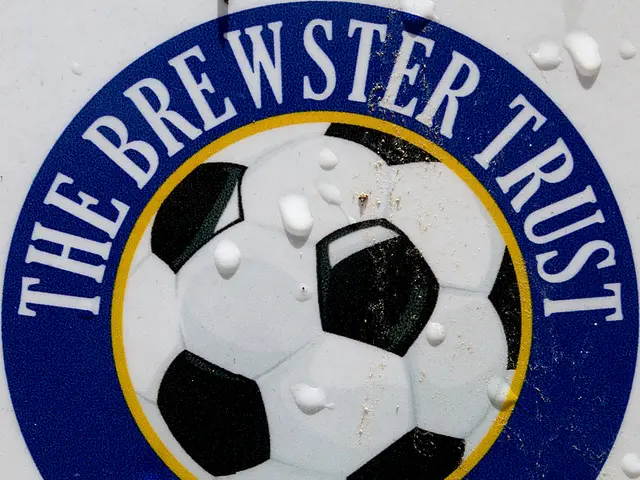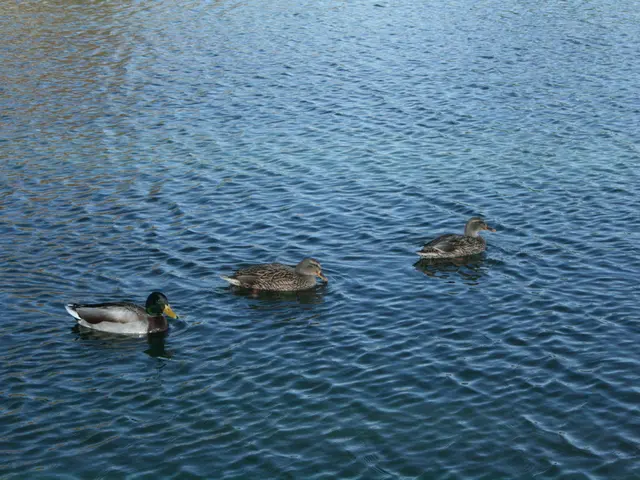Otters in Bavaria: A Contentious Issue Over Pond Economy
Are otters suitable for fishing activities? - Should Otter Hunting for Fish Be Permitted?
In the heart of Bavaria, the fierce debate around otter hunting, particularly in regions like Bayreuth, Schwandorf, Tirschenreuth, and Cham, is heating up. While some see the otter as a threat to their pond economy, others view it as a protected species.
After the Bavarian government sanctioned exceptional otter hunting, designated areas have been identified. However, the upper nature conservation authority in the district office must approve these removals. Applications have already been filed for the year 2025, with no decisions made yet.
At the moment, only Tirschenreuth and Schwandorf districts have applications for up to five otter removals annually. Meanwhile, no applications have been lodged in Cham or the district of Amberg-Sulzbach.
"Otters decimating the pond economy"
Franz Löffler, President of the Upper Palatinate District Council and Cham District Administrator, voiced concerns over the impact of otters on the pond economy. In Eastern Bavaria, the otter has a substantial share in this decline. Löffler hinted that despite various protective measures and financial compensations, there has been no change. A compromise seems to be in the offing.
Tirschenreuth District Administrator Roland Grillmeier expressed hope that the recent regulation is "a step towards effective otter management." He has long advocated for pond keepers, whose future allegedly hangs in the balance in one of the most important pond regions in Europe.
Otter hunting is only permissible in Upper Franconia's Bayreuth, Hof, and Wunsiedel districts, with two to five removals allowed annually. So far, no pond keeper has submitted an application at Bayreuth's district office.
Rising stress for fish
An otter needs approximately 400 to 500 kilograms of food annually, with 95% being fish. When it feeds in ponds, not just the actual consumption is a concern, but also the stress fish undergo due to the threat. They consume less and are more susceptible to diseases as a result.
Several pond farmers have reportedly abandoned their craft in recent years due to otter damage, according to Bavaria's Hunting Minister Hubert Aiwanger (Free Voters). Otters also endanger fish in open waters.
Environmentalists take a different stance. The German Environmental Aid (DUH) has sued the Upper Franconian government's general decree with the Bayreuth Administrative Court, alleging it contradicts species, animal, hunting, and EU law. Otters are strictly protected because they were once on the verge of extinction in significant parts of Germany.
Rivers demanding revival
DUH's Bundesgeschäftsführer Sascha Müller-Kraenner criticized the Bavarian state government, stating, "Otters have long been blamed for issues in the pond economy. Instead of resorting to weapons, there are numerous measures that don't pit otters and pond economies against each other." Simple solutions include electric fences or decoy ponds. "The real need," Müller-Kraenner added, "is for Bavaria's rivers to undergo rejuvenation."
Germany's stance on otters has stirred controversy in the past. In spring 2024, the Bavarian Administrative Court declared an otter regulation ineffective, prohibiting animal shooting. Now, environmentalists are gearing up for another legal battle against the latest regulation.
- Otter Hunting
- Otters
- Bavaria
- Upper Franconia
- Upper Palatinate
- CSU
- Regensburg
- Schwandorf
- Tirschenreuth
- Neustadt an der Waldnaab
- Cham District
- Eastern Bavaria
[Enrichment Insights]Otters are protected under European Union law (Habitats Directive) and are generally prohibited from being hunted. While there might be exceptions in certain circumstances, recreational hunting is not common. In Germany, the Federal Nature Conservation Act (BNatSchG) and the Hunting Act (BJagdG) regulate wildlife management. As otters are considered threatened species, public opinion in Germany leans towards wildlife conservation. For specific regulations and public opinions in the districts of Bayreuth, Schwandorf, Tirschenreuth, and Cham, consulting local authorities or conservation groups would be necessary. These areas are part of Bavaria, where environmental policies aim to follow national and EU directives.
- The Commission's proposed Directive on the protection of animals and plant products aims to ensure uniform laws across Member States, including Bavaria, where otter hunting is a contentious issue in districts like Bayreuth, Schwandorf, Tirschenreuth, and Cham.
- InUpper Franconia's Bayreuth, Hof, and Wunsiedel districts, otter hunting is permitted with two to five removals allowed annually, despite stringent protection laws for otters under the Habitats Directive and the German Environmental Aid (DUH) filing a lawsuit against the local government's otter regulations.
- In the Upper Palatinate district, Cham District Administrator Franz Löffler, concerned about the impact of otters on the pond economy, hinted at the need for a compromise, while Tirschenreuth District Administrator Roland Grillmeier expressed hope that recent regulations would provide effective otter management.







